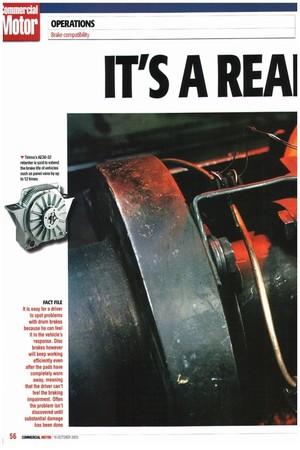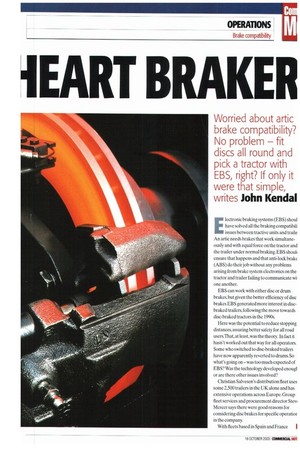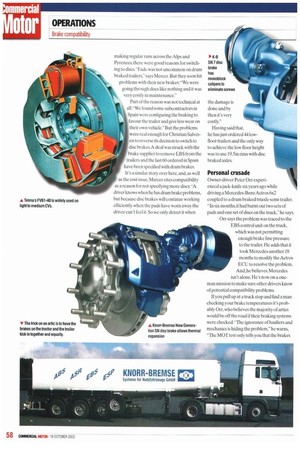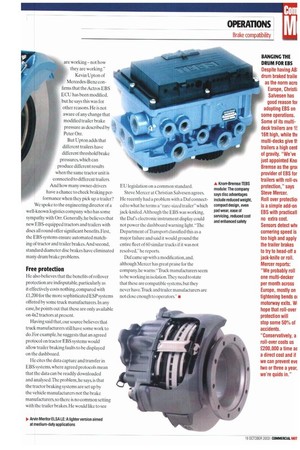IT'S A ItElil IENIT BRAKER
Page 56

Page 57

Page 58

Page 59

If you've noticed an error in this article please click here to report it so we can fix it.
Worried about artic brake compatibility?
No problem — fit discs all round and
pick a tractor with
EBS, right? If only it were that simple,
writes John Kendal Electronic braking systems (EBS) shout have solved all the braking oornpatibili issues between tractive units and traile An artic needs brakes that work simultaneously and with equal force on the tractor and the trailer under normal braking. EBS shoull ensure that happens and that anti-lock brake (ABS) do their job without any problems arising from brake system electronics on the tractor and trailer failing to communicate I,vii one another.
EBS can work with either disc or drum brakes, but given the better efficiency of disc brakes EBS generated more interest in discbraked trailers, following the move towards disc-braked tractors in the 1990s.
Here was the potential to reduce stopping distances, assuring better safety for all road users.That, at least, was the theory. In fact it hasn't worked out that way for all operators. Some who switched to disc-braked trailers have now apparently reverted to drums. So what's going on — was too much expected of EBS? Was the technology developed enougt or are there other issues involved?
Christian Salvesen's distribution fleet uses some 2500 trailers in the UK alone and has extensive operations across Europe. Group fleet services and procurement director Stevi Mercer says there were good reasons for considering disc brakes for specific operatior in the company.
With fleets based in Spain and France I making regular runs across the Alps and Pyrenees, there were good reasons for switching to discs.-Fade was not uncommon on drum braked trailers," says Mercer. But they soon hit problems with their new brakes:"We were going through discs like nothing and it was very costly in maintenance.
Part of the reason was not technical at all:"We found some subcontractors in Spain were configuring the braking to favour the trailer and give less wear on their own vehicle." But the problems were real enough for Christian Salvesen to reverse its decision to switch to disc brakes. A deal was struck with the brake supplier to remove EBS from the trailers and the last 60 ordered in Spain have been specified with drum brakes. It's a similar story over here, and, as well as the cost issue. Mercer cites compatibility as a reason for not specifying more discs:-A driver knows when he has drum brake problems, but because disc brakes will continue working efficiently when the pads have worn away the driver can't feel it. So we only detect it when the damage is done and by then it's very costly."
Having said that, he has just ordered 44 lowfloor trailers and the only way to achieve the low floor height was to use 19.5in rims with disc braked axles.
Personal crusade Owner-driver Peter Orr experienced a jack-knife six years ago while driving a Mercedes-Benz Actros 6x2 coupled to a drum braked triaxle semi-trailer. "In six months., it had burnt out two sets of pads and one set of discs on the truck," he says.
Orr says the problem was traced to the EBS control unit on the truck, which was not permitting enough brake line pressure to the trailer. He adds that it took Mercedes another 18 months to modify the Actros ECU to resolve the problem. And, he believes. Mercedes isn't alone. He's now on a oneman mission to make sure other drivers know of potential compatibility problems.
If you pull up at a truck stop and find a man checking your brake temperatures it's probably Orr, who believes the majority of artics would be off the road if their braking systems were checked."The ignorance of hauliers and mechanics is hiding the problem," he warns, "The MOT test only tells you that the brakes are working— not how they are working."
Kevin Upton of Mercedes-Benz con firms that the Actros EBS ECU has been modified.
but he says this was for other reasons. He is not aware of any change that modified trailer brake pressure as described by 4 Peter Orr.
But Upton adds that different trailers have different threshold brake pressures, which can produce different results when the same tractor unit is connected to different trailers.
And how many owner-drivers have a chance to check braking performance when they pick up a trailer?
We spoke to the engineering director of a well-known logistics company who has some sympathy with Orr. Generally, he believes that new EBS-equipped tractors and trailers with discs all round offer significant benefits. First. the EBS systems ensure automated matching of tractor and trailer brakes.And second, standard diameter disc brakes have eliminated many drum brake problems.
Free protection He also believes that the benefits of rollover protection are indisputable, particularly as it effectively costs nothing, compared with £1,200 for the more sophisticated ESP systems offered by some truck manufacturers. In any ease, he points out that these are only available on 4x2 tractors at present.
Having said that, our source believes that truck manufacturers still have some work to do. For example, he suggests that an agreed protocol on tractor EBS systems would allow trailer braking faults to be displayed on the dashboard.
He cites the data capture and transfer in EBS systems, where agreed protocols mean that the data can be readily downloaded and analysed.The problem, he says. is that the tractor braking systems are set up by the vehicle manufacturers not the brake manufacturers, so there is no common setting with the trailer brakes. He would like to see EU legislation on a common standard.
Steve Mercer at Christian Salvesen agrees. He recently had a problem with a Daf connected to what he terms a "rare-sized trailer"which jack-knifed. Although the EBS was working. the Des electronic instrument display could not power the dashboard warning light. "The Department of Transport classified this as a major failure and said it would ground the entire fleet of 60 similar trucks if it was not resolved," he reports.
Daf came up with a modification, and. although Mercer has great praise for the company.he warns:-Truck manufacturers seem to be working in isolation.They need to state that these are compatible systems. but they never have.Truck and trailer manufacturers are not close enough to operators." •
































































































































































































